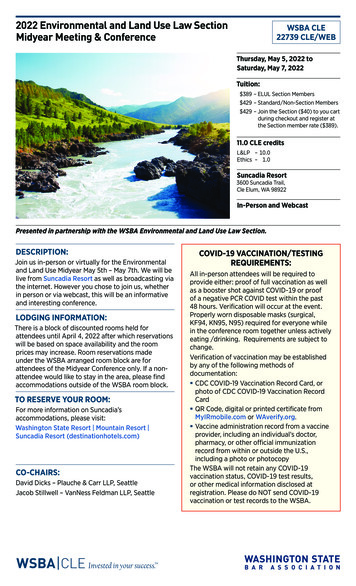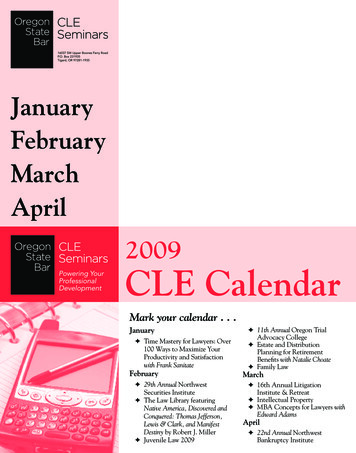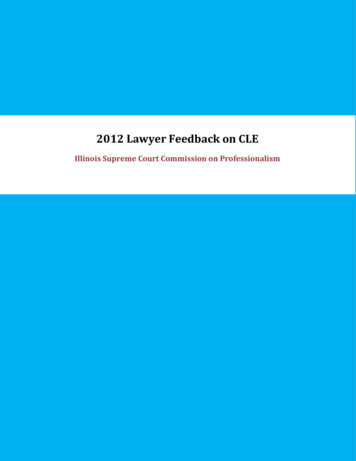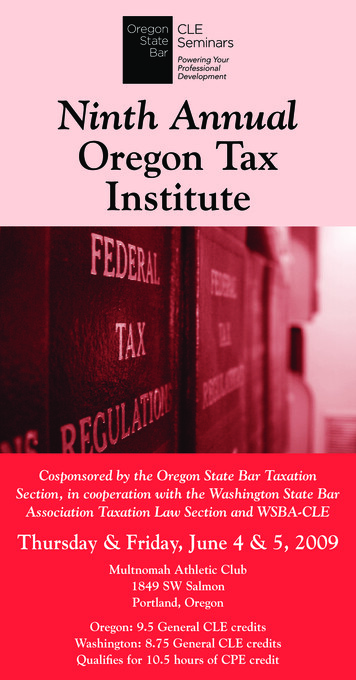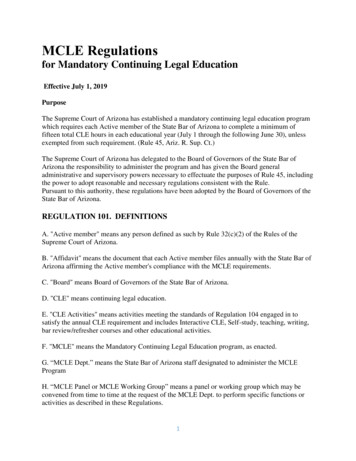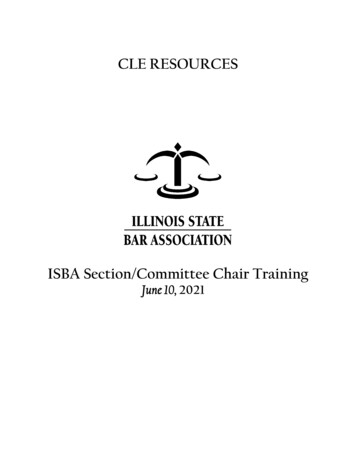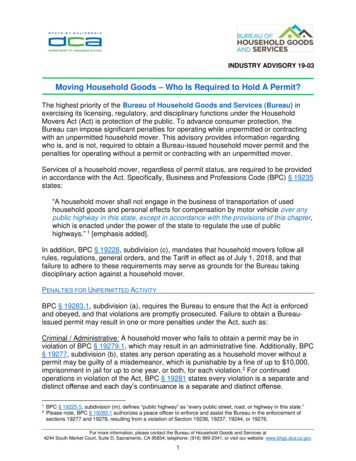
Transcription
BUREAUOFCle aA HOUSEHOLD GOODSAND SERVICESDEPARTMENT OF CONSUM!R AEFAI.RSINDUSTRY ADVISORY 19-03Moving Household Goods – Who Is Required to Hold A Permit?The highest priority of the Bureau of Household Goods and Services (Bureau) inexercising its licensing, regulatory, and disciplinary functions under the HouseholdMovers Act (Act) is protection of the public. To advance consumer protection, theBureau can impose significant penalties for operating while unpermitted or contractingwith an unpermitted household mover. This advisory provides information regardingwho is, and is not, required to obtain a Bureau-issued household mover permit and thepenalties for operating without a permit or contracting with an unpermitted mover.Services of a household mover, regardless of permit status, are required to be providedin accordance with the Act. Specifically, Business and Professions Code (BPC) § 19235states:“A household mover shall not engage in the business of transportation of usedhousehold goods and personal effects for compensation by motor vehicle over anypublic highway in this state, except in accordance with the provisions of this chapter,which is enacted under the power of the state to regulate the use of publichighways.” 1 [emphasis added].In addition, BPC § 19228, subdivision (c), mandates that household movers follow allrules, regulations, general orders, and the Tariff in effect as of July 1, 2018, and thatfailure to adhere to these requirements may serve as grounds for the Bureau takingdisciplinary action against a household mover.PENALTIES FOR UNPERMITTED ACTIVITYBPC § 19283.1, subdivision (a), requires the Bureau to ensure that the Act is enforcedand obeyed, and that violations are promptly prosecuted. Failure to obtain a Bureauissued permit may result in one or more penalties under the Act, such as:Criminal / Administrative: A household mover who fails to obtain a permit may be inviolation of BPC § 19279.1, which may result in an administrative fine. Additionally, BPC§ 19277, subdivision (b), states any person operating as a household mover without apermit may be guilty of a misdemeanor, which is punishable by a fine of up to 10,000,imprisonment in jail for up to one year, or both, for each violation.2 For continuedoperations in violation of the Act, BPC § 19281 states every violation is a separate anddistinct offense and each day’s continuance is a separate and distinct offense.12BPC § 19225.5, subdivision (m), defines “public highway” as “every public street, road, or highway in this state.”Please note, BPC § 19283.1 authorizes a peace officer to enforce and assist the Bureau in the enforcement ofsections 19277 and 19278, resulting from a violation of Section 19236, 19237, 19244, or 19276.For more information, please contact the Bureau of Household Goods and Services at4244 South Market Court, Suite D, Sacramento, CA 95834; telephone: (916) 999-2041; or visit our website: www.bhgs.dca.ca.gov.1
BUREAUOF HOUSEHOLD GOODSAND SERVICESIndustry Advisory 19-03Civil: BPC § 19237, subdivision (b), prohibits an unpermitted household mover fromenforcing any security interest to recover money owed for the transportation ofhousehold goods. Further, any person who utilizes the services of an unpermittedhousehold mover may bring civil action to recover all money paid to that mover.Contracting: Contracting with an unpermitted household mover is a violation of BPC§ 19278, which is a misdemeanor and could subject the contracting party to a fine up to 1,000, three months in jail, or both. Again, every violation is a separate and distinctoffense and each day’s continuance is a separate and distinct offense.BUSINESSES REQUIRED TO OBTAIN A HOUSEHOLD MOVER PERMITBPC § 19237 requires any person or entity who acts as a household mover in Californiato obtain a Bureau-issued permit and possess an operating authority issued by theFederal Motor Carrier Safety Administration (FMCSA) if transporting household goodsfrom this state to another state or from another state to this state. A “household mover”is defined, in part, by BPC § 19225.5, subdivision (h), as:“permitted or unpermitted transportation for compensation or hire as a business bymeans of a motor vehicle or motor vehicles being used in the transportation of usedhousehold goods and personal effects over any public highway in this state.”The information provided below is specific to several business models that commonlyoperate within the household mover scope: 1) Restoration Companies, 2) Inter-StateHousehold Movers, 3) Brokers, and 4) Storage Containers (Pods). The Act does notprovide for a statutory exemption for these business models. Accordingly, eachbusiness model must obtain a Bureau issued household mover permit to perform theservices of a household mover in California.RESTORATION COMPANIES3Restoration companies clean up damage to a home and property following acatastrophic event, such as a natural disaster or other event that causes significantdamage to a home. Restoration companies preserve the home and its contents so thatfurther damage does not occur.During that process, a restoration company may move consumer’s household goods toan alternate location for testing, restoration, and/or storage while the home is restored.This service is known as a move-out or pack-out. If a restoration company transportsthe household goods for compensation over a highway in California, that restorationcompany is subject to the statutory requirements of the Act and must be permitted bythe Bureau as it is operating as a household mover.3Depending on the type of work performed, restoration companies may also be subject to licensure requirements bythe Contractors State Licensing Board or the Bureau’s Electronic and Appliance Repair Dealer Registration Law.For more information, please contact the Bureau of Household Goods and Services at4244 South Market Court, Suite D, Sacramento, CA 95834; telephone: (916) 999-2041; or visit our website: www.bhgs.dca.ca.gov.2
BUREAUOF HOUSEHOLD GOODSAND SERVICESIndustry Advisory 19-03BROKERSA broker is defined by BPC § 19225.5, subdivision (a), as:“a person engaged by others in the act of arranging, for compensation, the intrastatetransportation of used household goods by a motor vehicle over the highways of thisstate for, or on behalf of, a shipper, a consignor, or a consignee.”Additionally, BPC § 19225.5, subdivision (h), states a broker shall be considered ahousehold mover. Consequently, a broker must obtain a permit to arrange for thetransport of household goods in California. Because brokers are considered householdmovers, brokers must also comply with all laws applicable to household movers,including the Tariff, which requires a visual inspection prior to issuing an estimate.A Broker of Household Goods permit from the FMCSA does not qualify as authority toact as a broker for moves that take place within California. While the FMCSA permitallows a broker to arrange for inter-state moves, a California permit is required for anymove on a highway in this state.INTER-STATE HOUSEHOLD MOVERSAn inter-state household mover must obtain a Bureau-issued permit to operate withinCalifornia when transporting household goods in California, as well as an operatingauthority from the FMCSA to operate from state to state.BPC § 19237 prohibits a household mover, including brokers, from engaging, orattempting to engage, in the business of the transportation of used household goodsand personal effects by motor vehicle over any public highway in this state, unless bothof the following are met:1. For transportation of household goods entirely within this state, there is in force apermit issued by the Bureau authorizing those operations.2. For transportation of household goods from this state to another state or fromanother state to this state, there is in force a valid operating authority issued bythe FMCSA.Federal AuthorityTitle 49 of the United States Code (U.S.C), § 14501, states federal authority regardingintrastate transportation and prohibits states from enacting or enforcing laws related to aprice, route, or service of any motor carrier with respect to the transportation of property.However, subparagraph (c)(2)(B) of § 14501 states the prohibition does not apply to thetransportation of household goods within a state.Consequently, to transport household goods in California, inter-state household moversmust comply with permit and other requirements of the Act and all other applicable lawsrelated to the transportation of household goods while in California.For more information, please contact the Bureau of Household Goods and Services at4244 South Market Court, Suite D, Sacramento, CA 95834; telephone: (916) 999-2041; or visit our website: www.bhgs.dca.ca.gov.3
BUREAUOF HOUSEHOLD GOODSAND SERVICESIndustry Advisory 19-03STORAGE CONTAINERS, “PODS”, OR OTHER STORAGE DELIVERY SERVICESIn California, moving packed storage containers to a storage facility, another house, orany other location is within the scope of a household mover because moving thecontainer involves transporting household goods. Consequently, a household moverpermit and compliance with all applicable laws is required to perform this service.California’s requirements may be obscured by the federal definition of household moverin 49 U.S.C. § 13102, subparagraph (12), which states a household mover is a motorcarrier that in the course of transporting household goods, offers the services of bindingand non-binding estimates, inventorying, packing and unpacking of items and personalresidences, and loading and unloading at personal residences. Additionally, 49 U.S.C.§ 13102, subsection (12)(C), grants a limited service exclusion for motor carriers thattransport containers or trailers that are entirely loaded and unloaded by somebody notaffiliated with the motor carrier.Based on the federal codes, many companies that deliver and transport storagecontainers to be packed by the consumer believe they are exempt from Bureau permitrequirements, but that limited service exemption only applies to federal requirements.As stated in the section on inter-state movers, 49 U.S.C. § 14501, subparagraph(c)(2)(b), allows states to adopt and enforce laws to regulate household movers.There is a limited exemption in California provided by BPC § 21701.1 for Self-ServiceStorage Facilities, which is an exemption from regulation under the Act, not from permitrequirements, as described below.If the owner or operator of a self-service storage facility or household mover transportscontainers to and from a self-service facility owned or operated by the owner, operator,or household mover, the activity may be exempt from regulation under the Act if theowner, operator, or household mover meets all of the following requirements:41. Does not charge more than 100 to deliver an empty storage container andtransport the loaded container or to deliver a loaded container and pick up theempty container.2. Does not handle the contents of the container (this also applies to affiliates).3. Has obtained a Bureau household mover permit or a Department of MotorVehicle (DMV) registration as a motor carrier of property.4. Has procured and maintained cargo insurance in the amount of at least 20,000per shipment.5. Provides a disclosure to the customer regarding the container transfer servicesoffered.6. Provides the customer with a brochure containing specified information regardingloading the container.4Please refer to BPC § 21701.1 for a full description of the exemption requirements.For more information, please contact the Bureau of Household Goods and Services at4244 South Market Court, Suite D, Sacramento, CA 95834; telephone: (916) 999-2041; or visit our website: www.bhgs.dca.ca.gov.4
BUREAUOF HOUSEHOLD GOODSAND SERVICESIndustry Advisory 19-03Although meeting all of these statutory criteria exempts the activity from regulationunder the Act, the applicable operating authority from the Bureau or DMV is stillrequired as noted by BPC § 21707.1, subsection (a)(3).BUSINESSES NOT REQUIRED TO OBTAIN A HOUSEHOLD MOVER PERMITFollowing are examples of industries that are commonly mistaken for householdmovers, but they are not required to obtain a Bureau household mover permit.FREIGHT FORWARDERSDuties of a freight forwarder are described by 46 U.S.C § 515.2, subsection (h), asdispatching of shipments on behalf of others and 49 U.S.C. § 13102, subparagraph (8)as an intermediary to arrange for shipments. In other words, freight forwarders arrangefor the use of a motor carrier (among many other services) to ensure freight reaches itsdestination. In most cases, freight forwarders are subject to federal jurisdiction and musthold operating authority from the Federal Maritime Commission.While businesses that transport used household goods may also be subject to federaljurisdiction, that is typically because the household mover activity is between states, notbecause the company is performing the duties of a freight forwarder. An entity that trulyoperates as a freight forwarder does not fall within the scope of a household mover andtherefore, is not required to obtain a Bureau permit. However, any freight forwarder thatdoes transport household goods in California must obtain a Bureau-issued permit.MOTOR CARRIERS OF PROPERTYAny person who operates a commercial motor vehicle, as defined by Vehicle Code§ 34500, any truck with two or more axles weighing more than 10,000 pounds, or anyother motor vehicle used to transport property for compensation is considered a motorcarrier of property. Motor carriers of property are prohibited from operating acommercial vehicle on any highway in this state unless they have registered as a motorcarrier of property with the DMV.Possession of a motor carrier of property registration with the DMV does not exemptany person or entity who is performing the duties of a household mover from obtaining aBureau household mover permit. Vehicle Code § 34601, subsection (a), excludeshousehold movers, as defined by the Act, from the definition and requirements of amotor carrier of property, i.e. a motor carrier of property must obtain a household moverpermit to operate within the scope of a household mover even if it is registered as amotor carrier of property with the DMV.If you have questions regarding motor carriers of property, please visit the DMV’s MotorCarrier Permit (MCP) - Frequently Asked Questions for more information.For more information, please contact the Bureau of Household Goods and Services at4244 South Market Court, Suite D, Sacramento, CA 95834; telephone: (916) 999-2041; or visit our website: www.bhgs.dca.ca.gov.5
If the owner or operator of a self-service storage facility or household mover transports containers to and from a self-service facility owned or operated by the owner, operator, or household mover, the activity may be exempt from regulation under the Act if the owner, operator, or household mover meets . all . of the following requirements: 4 . 1.

